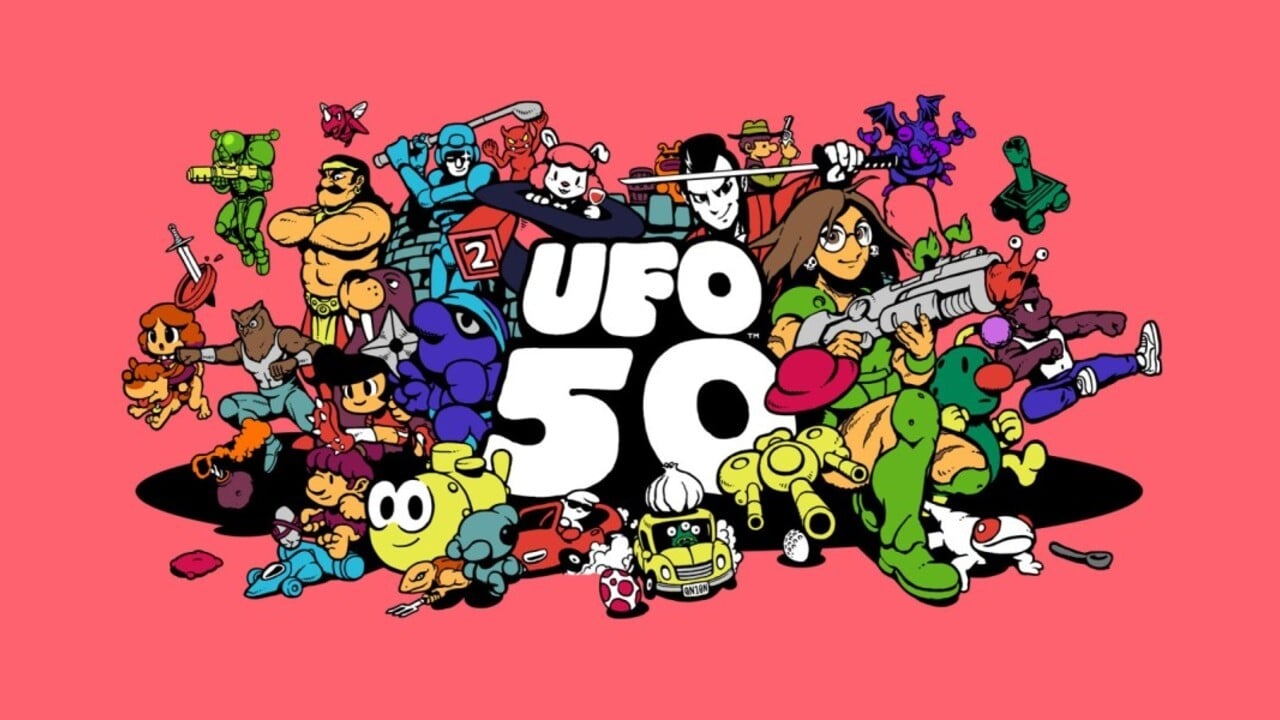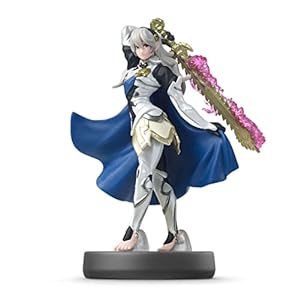

While playing UFO 50 for this review, I visited an exhibition at London’s Science Museum: Power Up – a hands-on tour of the last five decades of video games. There, in an expansive, dark basement, an orange-illuminated wall of computers and consoles took me right through the 1980s. I sampled such delicacies as a flickery Chuckie Egg on the BBC Micro, an Asteroids-type game on the Vectrex, and Metroid on the NES. It was like an 8-bit time machine, beep-blooping me into any year I fancied, to have a little taste of what was there.
UFO 50 is just like that – except the time machine has taken a wrong turn and ended up in a parallel universe. Here, a pioneering (fictional) company, UFO Soft, produced a snazzy home console called the Lazer-X, then prolifically churned out games for it over eight years from 1982 to 1989. The IRL developers – a group of six indie devs at Mossmouth (Derek Yu’s studio behind Spelunky) – calling themselves the “UFO 50 Recovery Team”, unearthed this machine. They also rescued 50 of its games, so the story goes, and lovingly restored them so that players could transport themselves back through “history”.

And talk about committing to the bit. UFO 50 opens with the credits (otherwise you’d need to get through 50 games to see them, I guess), in which the team is seen in lo-fi photos finding and rescuing the Lazer-X and its games. Then, you see a screenful of 50 disks, navigated using only the d-pad and two buttons found on the Lazer-X itself. Highlighting a game gives you only the slightest information, immediately creating a sense of exploration. Each equally alluring, it’s almost impossible to choose where to start. Thinking I’d need to play them all for this review, I went chronologically, jumping in with 1982’s Barbuta.
One distinctive thing about the games of the ’80s was how unfair they could sometimes be. No tutorials, no hand-holding, but a lot of trial and error. I won’t spoil it, but the first button-press of the first game of the anthology is a joke riffing on that – and a pretty good one, too. ‘Barbuta’ is a rudimentary Metroidvania which, while rather inscrutable, is full of charm. Before I knew it, an hour had disappeared, and I realised I’d only illuminated one of the icons on the jam-packed game selection screen. Pushing on in chronological order was going to be too workmanlike, so I just started to browse. And that’s where the joy of UFO 50 really comes out.

In an Edge magazine interview in 2024, co-developer and composer Eirik Suhrke explained that the overwhelming one-time dump of 50 games – not gated, not structured – was intended to conjure the feeling of picking through shareware titles or demo discs. You might also say it’s like scrolling through a pile of ROMs. It’s the opposite of squeezing every last drop out of the one game you got for Christmas as a kid: nothing needs to be played for more than a few moments if you don’t want to. Switching games is so rapid and frictionless that the huge catalogue soon merges into one singular game experience.
You might compare it to WarioWare in that regard, but while Wario’s sequences of micro-games immediately dissolved into just one uber-game, the parts of UFO 50 are much more substantial, and the overall game therefore absolutely epic. Its component parts may include relatively throwaway arcade titles, like ‘Magic Garden’ and ‘Ninpek’ (although even those bring some good ideas), but there’s also a fully fledged JRPG, a brilliant deck builder, multiple puzzle games, platformers, sequels to those platformers…. These are 50 full games, ready to pick up and put down, like you’re strolling around the Science Museum’s exhibits. Some will land with you, some won’t, but the luxury of having them all there means you’ll dip into genres you might not normally go for. You need only play any game for as long as your curiosity lasts – but too many of them caught me off guard, and the hours disappeared unnoticed.

In a way, of course, UFO 50 is a study of the real history of games – the conventions, technologies and design principles that all had to find their feet in those early years. But since this is just one interpretation of game history, it’s very strongly subjective. As such, it’s not exclusionary – not the private domain of experts or older players: a 12-year-old in 2025 could pick this all up without ever having seen a CRT. It’s particularly interesting then to consider the personal gaming history of the developers – wouldn’t it be fascinating to know what shaped their fantasy of gaming’s growth through the 80s? Luckily enough, Derek Yu appeared on the podcast My Perfect Console when UFO 50 launched on Steam, and shared just that.
He told of his experience of NetHack, a 1987 roguelike. More than the game itself, the fascination was that he found it on a disk in his house and loaded it up in DOS, not even knowing whether it was a game at all. The pure mystery of that comes across when diving into some random option in UFO 50. Yu also talked about his dad drawing maps of The Legend of Zelda – perhaps no surprise, then, that ‘Barbuta’ features a blank grid in the corner of the UI, practically shouting at you to get your graph paper, like a pixelated maths teacher.
While the joyous mystery of flicking through disks is all there by design, there’s one unplanned fact about UFO 50: it took a real-world eight years to make – not the usual two or three. That in itself is an enticing story: while there are rich snippets of the history of UFO Soft’s games and growth, I’d lap up a version of the game that spelled out the true history of Mossmouth and its eight-year quest. Which games came first? What led to what? How were all the inevitable ups and downs?
Conclusion
What stands out about UFO 50, Mossmouth’s delightful collection of retro-styled games, is not that so many of them are absolute bangers – although they are – rather, it’s the fact that it genuinely all comes together as a single experience. In this game, you are a visitor in some wonderful exhibition, and UFO 50 is your 8-bit time machine. It’s magnificent, and a perfect fit for Switch.
Trending Products

Amiibo – Sephiroth – Super Smash Bros. Series










